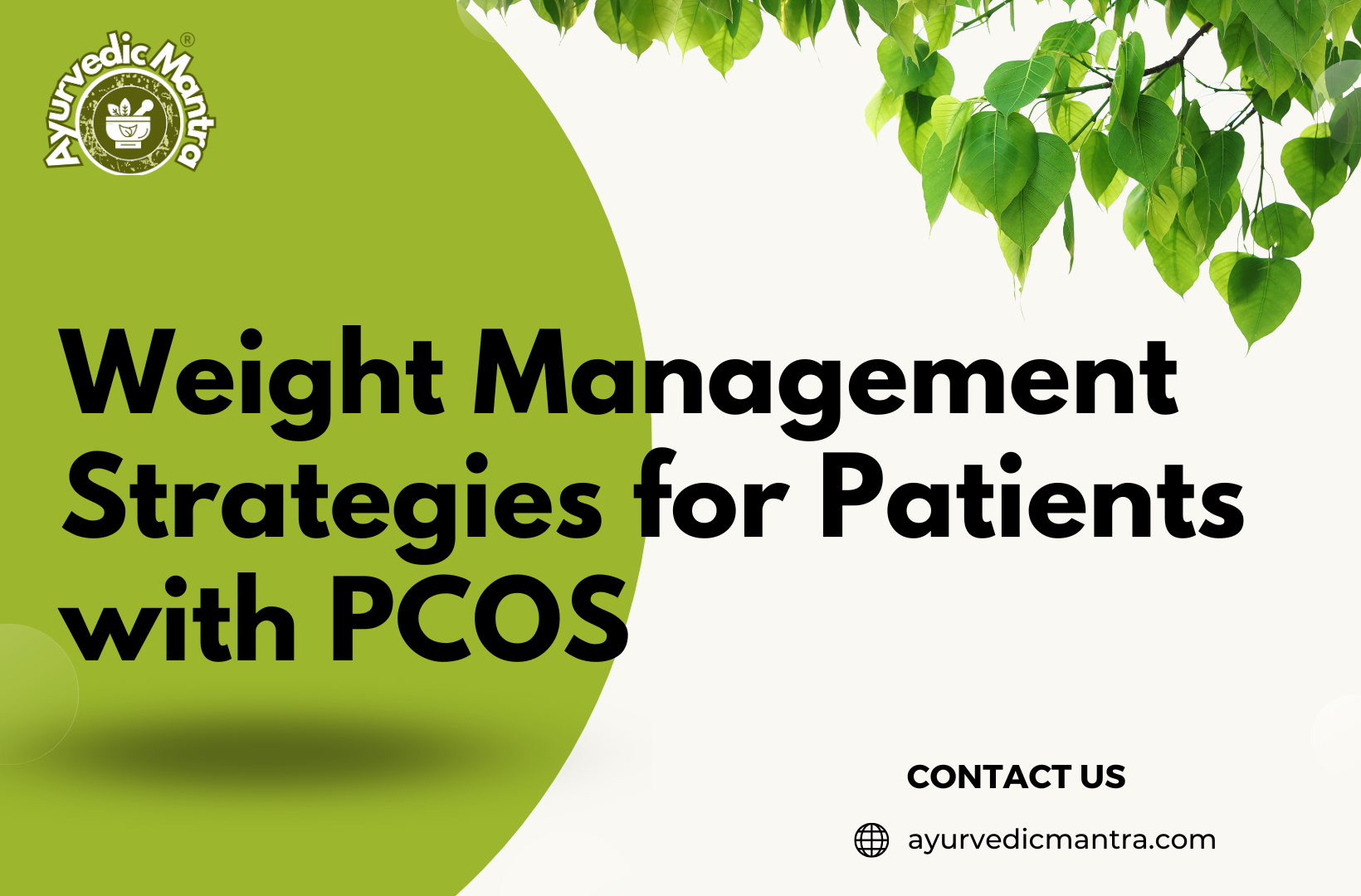
PCOD/PCOS: Ayurvedic Treatment is Best
Introduction Polycystic Ovary Disorder (PCOD) or Polycystic Ovary Syndrome (PCOS) is a common endocrine disorder affecting millions of women worldwide. It leads to hormonal imbalances,

Polycystic Ovary Syndrome (PCOS) is a common hormonal disorder that affects many women of reproductive age. One of the challenges often faced by individuals with PCOS is weight management. The hormonal imbalances associated with PCOS can make it harder to maintain a healthy weight, but it is possible to achieve weight management goals effectively with the right strategies. In this article, we’ll explore critical strategies to help patients with PCOS manage their weight and improve their overall well-being.
Before delving into effective weight management strategies, it’s essential to understand how PCOS and weight gain are connected. Women with PCOS often have higher insulin levels, a hormone that regulates blood sugar. Elevated insulin levels can lead to weight gain, as insulin promotes fat storage and inhibits fat breakdown. Furthermore, PCOS can increase appetite and cravings for sugary and high-calorie foods.
When managing weight with PCOS, a balanced and controlled diet is paramount. Start by reducing your intake of sugary foods and beverages. These can cause rapid blood sugar and insulin spikes, leading to fat storage. Opt for whole, nutrient-dense foods instead.
Incorporate complex carbohydrates with a low glycemic index (GI) into your diet. These carbs release glucose slowly, preventing sharp insulin spikes. Foods like whole grains, legumes, and non-starchy vegetables are excellent choices.
Protein-rich foods help you feel full and satisfied and stabilize blood sugar levels. Include lean protein sources such as poultry, fish, tofu, and legumes.
Don’t shy away from fats altogether. Opt for sources of healthy fats like avocados, nuts, seeds, and olive oil. These fats support hormone production and can help control cravings.
Engaging in regular physical activity is crucial for PCOS weight management. A combination of cardiovascular exercises like brisk walking, jogging, or cycling, along with strength training, can help boost metabolism and promote fat loss.
Activities like yoga and meditation can help reduce stress levels. High stress can lead to overeating or poor food choices, so managing stress is essential for successful weight management.
Aiming for 7-9 hours of quality sleep per night can positively impact weight management. Poor sleep can disrupt hunger hormones and lead to weight gain.
Chronic stress can contribute to weight gain in individuals with PCOS. Explore stress-reduction techniques such as deep breathing, mindfulness, or spending time in nature.
If lifestyle modifications alone aren’t leading to desired results, consult a healthcare professional. They can guide medication options or other medical interventions that may suit your needs.
Managing weight with PCOS requires a comprehensive approach encompassing dietary choices, exercise, sleep, stress management, and possibly medical interventions. By making informed decisions and adopting a holistic approach, individuals with PCOS can effectively manage their weight, improve their overall health, and enhance their quality of life. Consistency is crucial and minor; sustainable changes can lead to significant and lasting results.
Polycystic Ovary Syndrome (PCOS) is a hormonal disorder affecting women’s reproductive health. It can lead to irregular periods, ovarian cysts, and hormonal imbalances. PCOS can affect weight due to insulin resistance, which leads to higher insulin levels. Elevated insulin can stimulate fat storage and hinder fat breakdown, making weight management challenging.
Insulin resistance occurs when the body’s cells do not respond effectively to insulin, causing the pancreas to produce more insulin. This excess insulin promotes fat storage, especially in the abdominal area, and inhibits the body’s ability to use stored fat for energy. As a result, individuals with PCOS often experience weight gain, particularly around the midsection.
Adopting a balanced and controlled diet is crucial for PCOS weight management. Focus on reducing sugary foods and beverages, as they can lead to rapid spikes in blood sugar and insulin levels. Incorporate complex carbohydrates with a low glycemic index, such as whole grains and non-starchy vegetables. Prioritize lean proteins like poultry, fish, and legumes, and include sources of healthy fats like avocados and nuts.
Regular exercise plays a significant role in managing weight with PCOS. Cardiovascular activities like walking, jogging, and cycling help boost metabolism and burn calories. Strength training builds lean muscle mass, which can further increase metabolic rate. Exercise also enhances insulin sensitivity, making it easier for the body to utilize glucose for energy.
Yes, chronic stress can contribute to weight gain in PCOS patients. Stress triggers the release of cortisol, a hormone that can promote fat storage, especially in the abdominal area. Moreover, stress can lead to emotional eating and cravings for unhealthy foods, making weight management more challenging. Incorporating stress-reduction techniques like meditation and deep breathing can help mitigate these effects.
Getting adequate sleep is crucial for effective weight management in PCOS. Poor sleep disrupts hormones that regulate appetite, leading to increased hunger and cravings, particularly for high-calorie and sugary foods. Additionally, insufficient sleep can impair insulin sensitivity, exacerbating weight management challenges. Prioritize a consistent sleep schedule and create a conducive sleep environment for better results.
Yes, medical interventions can be considered if lifestyle changes alone are not yielding desired results. Healthcare professionals may prescribe medications to regulate insulin levels, manage appetite, or assist with weight loss. These interventions should be discussed with a healthcare provider to determine the most suitable approach based on individual needs and medical history.
Results can vary based on factors such as metabolism, lifestyle changes, adherence, and PCOS symptoms severity. Generally, adopting a consistent routine of balanced eating, regular exercise, stress reduction, and sufficient sleep can lead to noticeable changes over several weeks to months. Patience and persistence are vital to achieving sustainable and long-lasting weight management outcomes.
Yes, effective weight management can positively impact other PCOS symptoms. Improving insulin sensitivity and reducing excess weight may lead to more regular menstrual cycles, decreased ovarian cyst formation, and improved hormonal balance. Additionally, managing weight can enhance overall energy levels, mood, and self-esteem, improving the quality of life for individuals with PCOS.
Sustaining weight loss with PCOS involves maintaining healthy habits over the long term. Continue to prioritize a balanced diet rich in whole foods, engage in regular physical activity, and practice stress-reduction techniques. Monitoring portion sizes, staying hydrated, and regular check-ups with healthcare professionals are also essential. Consistency and a gradual approach are crucial to maintaining weight loss and overall well-being.

Introduction Polycystic Ovary Disorder (PCOD) or Polycystic Ovary Syndrome (PCOS) is a common endocrine disorder affecting millions of women worldwide. It leads to hormonal imbalances,

Introduction Losing weight is a journey that requires dedication, consistency, and self-care. While there are numerous weight loss techniques out there, not all of them

Polycystic Ovary Syndrome (PCOS) is a hormonal disorder that affects millions of women worldwide. It can lead to various health complications, such as irregular periods,

In recent years, Ayurveda, an ancient system of natural healing originating from India, has gained significant popularity as an alternative approach to treating various health

आजकल वजन बढ़ने और चर्बी की वृद्धि होने की समस्या एक आम समस्या बन गई है। बढ़ते वजन और अतिरिक्त चर्बी के कारण न केवल

प्रस्तावना: आजकल वजन बढ़ने और ओबेसिटी की समस्या एक आम समस्या बन गई है। बढ़ते वजन के कारण न केवल शारीरिक समस्याएं होती हैं, बल्कि
